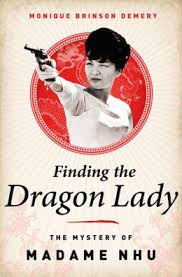Q&A with author Monique Brinson Demery
 Friday, September 13, 2013 at 6:03AM
Friday, September 13, 2013 at 6:03AM  Monique Brinson Demery is the author of the forthcoming book Finding the Dragon Lady: The Mystery of Vietnam's Madame Nhu, which looks at the life of the former South Vietnamese first lady. Demery lives in Chicago.
Monique Brinson Demery is the author of the forthcoming book Finding the Dragon Lady: The Mystery of Vietnam's Madame Nhu, which looks at the life of the former South Vietnamese first lady. Demery lives in Chicago.
Q: Why did you decide to write about Madame Nhu?
A: It started as a little girl—I was fascinated with the woman everyone said was so awful and evil and a “dragon lady.”
It wasn’t until I was out of grad school—I had been studying contemporary Vietnam, but to understand that, I had to look at all of the 20th century—that I stumbled [again] on the story of Madame Nhu.
I wasn’t sure at first it would be a book. I couldn’t believe that no one had written a book about her before.
Her life story read like a novel. Looking up basic information about her, I found that her parents had been murdered in the 1980s by her brother.
I never thought she would end up speaking to me.
Q: Did your impression of her change over the years that you were working on the book?
A: In the beginning, I was really in awe that she was taking the time to talk to me. What began as, “I can’t believe she’s talking to me,” turned quickly into empathy.
I was not the only person she spoke to—in the last two months, I’ve heard from two [other] people.
At the beginning, I was starstruck, and I took everything she said at face value. By the end, I was less naïve.
Q: I wanted to ask you about the relationships Madame Nhu had with various family members. What about her husband [Ngo Dinh Nhu, his brother Diem’s top political adviser]?
A: She would have described it as the perfect marriage, and that she was the perfect wife. [But] in her diary, she talked about how she resented how hard he was working, and about screaming fights. It’s a very different picture. Was she just venting, or was her marriage really that miserable? Is that [venting] what we would all do [in a diary]?
Q: What about her relationship with her brother-in-law, President Diem?
A: It seemed to me that by the end of her life, she respected him. In her heart of hearts, I think she thought her husband was a little smarter than Diem. She seemed to think he [Diem] was sort of naïve and trusting.
Q: She seemed to have a difficult relationship with her parents.
A: I tried to make sense of all the pieces that put Madame Nhu together. She struggled with trying to seem important to them [her parents], to be more than the middle child, the girl child, who wouldn’t amount to much.
Q: What do you think happened between her brother [Tran Van Khiem] and their parents?
A: Khiem stayed in the country after Diem and Nhu were killed. He wrote letters about how he was tortured and put in prison; it took a toll on him. He was not the best representative when he was 100 percent—he was seen as a playboy who was riding on his sister’s coattails. For all I know—I have not found him—he may still be living in France. He left the United States in the 1990s.
Q: Why did you decide to structure the book in alternating sections that describe your life and your reactions to Madame Nhu, and her own life?
A: It was to be the most honest I could. It was a nonfiction book. Some of the sources, like Madame Nhu herself, were unreliable.
[Also,] I was born in 1976 and a lot of people in my generation have trouble connecting to the Vietnam War. This put a younger spin on it—how Vietnam has come down through the decades.
Q: Why did you choose “Finding the Dragon Lady” as the book’s title?
A: I chose it because it was what I started out looking for—the powerful, diabolical woman. It doesn’t tell the whole story but it was what sucked me in, and I hoped it would draw readers.
“Dragon lady” is a racist thing to call an Asian woman. [It was used] in the 1960s, and it seemed like it was in keeping with the context. These stereotypes are based on sexism and racism. I chose the title because it fit with the concept of when Asia seemed so far away.
 The cover is really provocative—I was blown away. It reinforces the “dragon lady” stereotype, but it really grabs you.
The cover is really provocative—I was blown away. It reinforces the “dragon lady” stereotype, but it really grabs you.
Q: What was Madame Nhu’s reaction to the term “dragon lady”?
A: She was strangely flattered by it. She would rather go out as a dragon lady than as a nobody. “Dragon lady” would not be her first choice, but the saddest thing to her would be to be forgotten.
Q: What do you think people who know something about Madame Nhu have as their first impressions of her?
A: The Buddhist monk who burned himself and she said she would clap her hands and [talked about] a barbecue—that was so shocking, and it cemented her reputation as the terrible face of that regime.
I’m not sure people who remember the dragon lady remember that she was no longer in power as of [the coup in November] 1963. Most people associate her with the Vietnam War, but she was there before [the escalation] even started.
Q: What are you working on now?
A: The book is out on the 24th. I’m still in the thick of publicity, and I hope people will talk about and read the book.
I hope that when I’m done, I can pay more attention to my family.
I’m so grateful to Public Affairs—they believed that the book could be done by the 50th anniversary of the coup in November. For 18 months, I’ve been working very hard on the book.
Q: Anything else we should know?
A: It’s been 50 years since the coup, and 50 years since Kennedy died. I hope Madame Nhu’s story is a way to look at history, personalize it, and make it more whole.
--Interview with Deborah Kalb. This Q&A is also posted on deborahkalbbooks.blogspot.com.


Reader Comments